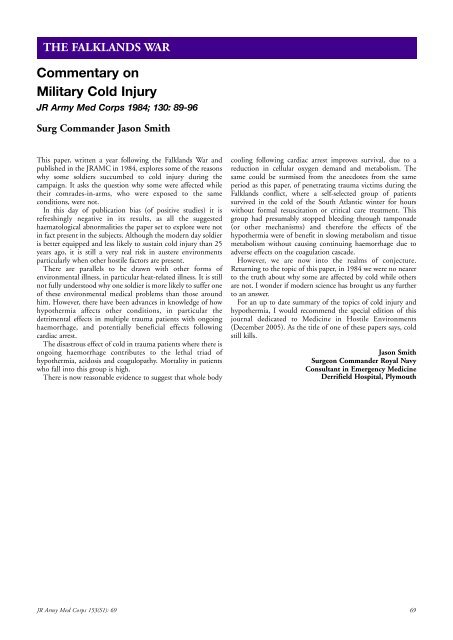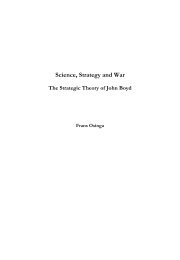Falklands war 25TH anniversarY - Boekje Pienter
Falklands war 25TH anniversarY - Boekje Pienter
Falklands war 25TH anniversarY - Boekje Pienter
You also want an ePaper? Increase the reach of your titles
YUMPU automatically turns print PDFs into web optimized ePapers that Google loves.
THE FALKLANDS WAR<br />
Commentary on<br />
Military Cold Injury<br />
JR Army Med Corps 1984; 130: 89-96<br />
Surg Commander Jason Smith<br />
This paper, written a year following the <strong>Falklands</strong> War and<br />
published in the JRAMC in 1984, explores some of the reasons<br />
why some soldiers succumbed to cold injury during the<br />
campaign. It asks the question why some were affected while<br />
their comrades-in-arms, who were exposed to the same<br />
conditions, were not.<br />
In this day of publication bias (of positive studies) it is<br />
refreshingly negative in its results, as all the suggested<br />
haematological abnormalities the paper set to explore were not<br />
in fact present in the subjects. Although the modern day soldier<br />
is better equipped and less likely to sustain cold injury than 25<br />
years ago, it is still a very real risk in austere environments<br />
particularly when other hostile factors are present.<br />
There are parallels to be drawn with other forms of<br />
environmental illness, in particular heat-related illness. It is still<br />
not fully understood why one soldier is more likely to suffer one<br />
of these environmental medical problems than those around<br />
him. However, there have been advances in knowledge of how<br />
hypothermia affects other conditions, in particular the<br />
detrimental effects in multiple trauma patients with ongoing<br />
haemorrhage, and potentially beneficial effects following<br />
cardiac arrest.<br />
The disastrous effect of cold in trauma patients where there is<br />
ongoing haemorrhage contributes to the lethal triad of<br />
hypothermia, acidosis and coagulopathy. Mortality in patients<br />
who fall into this group is high.<br />
There is now reasonable evidence to suggest that whole body<br />
cooling following cardiac arrest improves survival, due to a<br />
reduction in cellular oxygen demand and metabolism. The<br />
same could be surmised from the anecdotes from the same<br />
period as this paper, of penetrating trauma victims during the<br />
<strong>Falklands</strong> conflict, where a self-selected group of patients<br />
survived in the cold of the South Atlantic winter for hours<br />
without formal resuscitation or critical care treatment. This<br />
group had presumably stopped bleeding through tamponade<br />
(or other mechanisms) and therefore the effects of the<br />
hypothermia were of benefit in slowing metabolism and tissue<br />
metabolism without causing continuing haemorrhage due to<br />
adverse effects on the coagulation cascade.<br />
However, we are now into the realms of conjecture.<br />
Returning to the topic of this paper, in 1984 we were no nearer<br />
to the truth about why some are affected by cold while others<br />
are not. I wonder if modern science has brought us any further<br />
to an answer.<br />
For an up to date summary of the topics of cold injury and<br />
hypothermia, I would recommend the special edition of this<br />
journal dedicated to Medicine in Hostile Environments<br />
(December 2005). As the title of one of these papers says, cold<br />
still kills.<br />
Jason Smith<br />
Surgeon Commander Royal Navy<br />
Consultant in Emergency Medicine<br />
Derrifield Hospital, Plymouth<br />
JR Army Med Corps 153(S1): 69 69

















